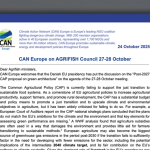The report “Feasibility of Coal in the Age of Renewable Energy: Hunutlu Thermal Power Plant Case” by WWF Turkey and SEFiA (Sustainable Economy and Financial Research Association) in collaboration with Climate Action Network (CAN) Europe reveals why coal investments no longer bring profits, through the example of the Hunutlu coal-fired thermal power plant that is under construction in Adana, Turkey.
According to information from different sources analysed in the report, the capital cost of the plant, which will have an installed capacity of 1320 MW if completed, will be between US$ 1.7 billion and US$ 2.1 billion. The financial participation of the Chinese Shanghai Electric Co, part of the Belt and Road Initiative, was key to making the construction of the new power plant possible.
In both cases, the report’s findings show that the projected revenue of the plant will be totally unable to cover its investment costs even after a 30-year long economic life, since coal is increasingly becoming a stranded asset compared with renewable energy for instance.
16 different scenarios were studied with variables related to electricity price and calorific value of coal under different capital investment and fixed operational costs. It turned out that in none of these scenarios did the plant make profits.
The report, prepared with the assumption that current market trends will continue and that there will be no excessive fluctuation in prices, points to an investment that is not economically meaningful for companies and financiers investing in the Hunutlu thermal power plant. It further reveals that this situation, as has happened in the past, will worsen if market conditions continue to develop against coal.
SEFiA (Sustainable Economy and Financial Research Association) Founding Director Bengisu Özenç, the author of the report said: “Our net present value calculations show that under the capital cost scenario which corresponds to the ultra-supercritical coal burning technology, the Hunutlu thermal power plant is unable to pay back its capital cost over a period of 30 years, even under the assumption of high electricity prices. It is therefore worth questioning the political economy and financial sustainability of this investment, which would have an installed capacity of 1320 MW if completed.”
Pointing out the fact that solar power generation costs have fallen by 90% and wind power by 70% in the last 11 years while the cost of electricity generation from coal-fired thermal power plants has increased by 1%, WWF-Turkey General Manager Aslı Pasinli said: “In an environment where coal exit scenarios are increasingly discussed, the construction of new coal-fired thermal power plants is a serious question mark. The answer to this question can be found in the financial feasibility studies on new plant investments, which are expected to stand idle not only because of climate change concerns but also with the shift of global financial flows. Therefore, we hope that this report on Hunutlu Thermal Power Plant will be an example and contribute to the green recovery and acceleration of Turkey’s transition to a low-carbon economy. Considering the economic profitability of renewable energy investments and their three times more employment capacity, we should not lag behind global trends in order to protect our country’s nature and foster economic development”.
Özlem Katısöz, Policy Coordinator for Turkey at Climate Action Network (CAN) Europe added: “The European Green Deal aims to increase action on climate change also in the EU’s neighbouring countries. Hence the EU should work with countries such as Turkey to prevent the construction of a new Chinese coal plant in its backyard. Investing in coal is not only destroying the health, environment and the climate, it is clearly a waste of money. Demand for coal declines as it gets more and more expensive, while renewables are already cheaper and much more profitable. Turkey and international investors must see the writing on the wall.”
ENDS
The full report can be found here.
Contacts:
Gül Türün, WWF-Turkey Senior Communications Specialist gturun@wwf.org.tr +90 532 377 15 18
Bengisu Özenç, Founding Director of SEFiA bengisu@sefia.org, +90 532 641 84 61
Özlem Katısöz, Policy Coordinator for Turkey at Climate Action Network (CAN) Europe, ozlem@climnet.org, +90 532 204 25 70
About Hunutlu Coal-Fired Thermal Power Plant:
Hunutlu Thermal Power Plant was granted with an electricity generation license in 2015 as a project of EMBA Electricity Generation Joint Stock Company, a joint venture between the Chinese Shanghai Electric Co., and CPI Power Engineering. Following the acquisition of the license, the project was granted VAT exemption over a fixed investment amount of TL 3.5 billion and customs tariff exemption on machinery equipment imports of US$ 768 million. According to information from different sources, the capital cost of the plant, which will have an installed capacity of 1320 MW if completed, will be between US$ 1.7 billion and US$ 2.1 billion.
About WWF-Turkey:
WWF is one of the largest and most experienced independent conservation organizations, with over 5 million supporters and a global network active in more than 100 countries. WWF’s mission is to stop the degradation of the planet’s natural environment and to build a future in which humans live in harmony with nature, by conserving the world’s biological diversity, ensuring that the use of renewable natural resources is sustainable and promoting the reduction of pollution and wasteful consumption.
About the Sustainable Economy and Financial Research Association (SEFiA):
SEFiA is a research-oriented non-governmental organization established to conduct independent studies in the fields of sustainable economy and sustainability financing, with a special focus on Turkey’s transition to a low-carbon economy and its fight against climate change. Aiming to develop its data, information and research capacity through national and international collaborations, SEFiA aims to contribute to low-carbon economy policies.
About CAN Europe:
Climate Action Network (CAN) Europe is Europe’s leading NGO coalition fighting dangerous climate change. With over 170 member organisations active in 38 European countries, representing over 1.500 NGOs and more than 47 million citizens, CAN Europe promotes sustainable climate, energy and development policies throughout Europe.



